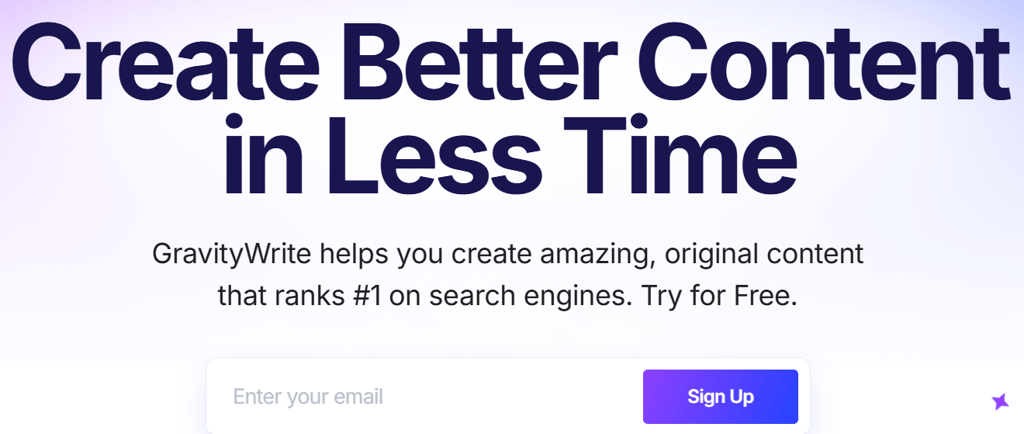10 Ways AI Enhances Your SEO Content Strategy
Discover 10 AI-driven strategies to supercharge your SEO content, from automation to personalization. Boost rankings, save time, and engage your audience effectively. AI-powered platforms like GravityWrite automate time-consuming tasks such as keyword research, content outlining, and on-page optimization, enabling teams to focus on strategic creativity. These tools analyze top-ranking content to recommend semantically relevant terms, ideal structures, and even voice-search-friendly phrases, ensuring your content aligns with Google’s evolving algorithms.
ONLINE TOOLS
3 min read
In today’s fast-paced digital landscape, SEO is no longer just about stuffing keywords or building backlinks. With artificial intelligence (AI) tools like GravityWrite reshaping industries, content creators and marketers can leverage cutting-edge tools to refine their SEO strategies, drive organic traffic, and stay ahead of competitors. From automating tedious tasks to crafting hyper-personalized content, AI is a game-changer. Let’s explore 10 powerful ways AI elevates your SEO content strategy.
1. Streamline Content Creation with AI Tools
AI-powered writing assistants like GravityWrite revolutionizing content creation. These tools generate blog outlines, product descriptions, and even full-length articles in minutes. By analyzing top-ranking content, AI suggests relevant topics, headlines, and structures aligned with user intent. For instance, SurferSEO’s AI outlines content briefs with optimal keyword density, headings, and semantic terms, ensuring your draft meets search engine criteria from the start.
2. Boost Productivity and Save Time
AI eliminates manual grunt work, freeing teams to focus on strategy. Automate tasks like:
Keyword Research: Tools like Ahrefs and SEMrush use AI to recommend high-opportunity keywords.
Content Optimization: Platforms like Clearscope analyze top-performing pages and suggest improvements.
Editing: Grammarly and Hemingway Editor fix grammar, tone, and readability issues.
By reducing time spent on repetitive tasks, your team can produce 2–3x more content without compromising quality.
3. Optimize for Search Engines
AI tools dive deep into SEO metrics to ensure your content ranks. For example:
On-Page SEO: Tools like Alli AI audit pages for broken links, meta tags, and mobile-friendliness.
Semantic SEO: Natural Language Processing (NLP) identifies related terms (e.g., "best practices" for "tips") to enrich content.
Voice Search: AI optimizes content for conversational queries (e.g., "How do I fix a leaky faucet?").
4. Enhance Content Quality and Relevance
AI ensures your content is both high-quality and aligned with user intent. Tools like GravityWrite evaluate content depth, flagging gaps in coverage. Meanwhile, NLP algorithms analyze sentiment, ensuring your tone resonates with readers. For example, AI can adjust a technical article for beginners or experts based on audience data.
5. Scale Content Production
Need 50 blog posts in a month? AI makes bulk content creation feasible. Tools like GravityWrite also generates human-like articles on any topic, while ChatGPT crafts social media posts, emails, and FAQs. Combine AI-generated drafts with human editing for scalable, consistent output.
6. Personalize User Experience
AI analyzes user behavior (e.g., browsing history, location) to deliver dynamic content. Netflix and Amazon use this for recommendations, but marketers can apply it too:
Show personalized CTAs based on visitor demographics.
Adjust blog recommendations in real-time.
Tools like Dynamic Yield and Optimizely make personalization effortless.
7. Leverage Natural Language Processing (NLP)
NLP helps AI understand context, sarcasm, and nuances. Tools like GravityWrite use it to:
Improve chatbots for better customer interactions.
Optimize for voice search (e.g., long-tail, question-based keywords).
Analyze competitor content for weaknesses.
8. Implement Data-Driven Content Strategies
AI transforms raw data into actionable insights. Predictive analytics tools like BrightEdge forecast trending topics, while Google’s RankBrain prioritizes content based on user satisfaction metrics (e.g., bounce rate, dwell time). Tools like GravityWrite use AI to identify content gaps and prioritize high-impact topics.
9. Automate Content Distribution
AI schedulers like Buffer and Hootsuite determine optimal posting times across platforms. Meanwhile, tools like Canva’s Magic Design auto-generate social media visuals. Repurpose blogs into videos using Pictory.ai or into podcasts with Descript, maximizing reach with minimal effort.
10. Continually Improve SEO Performance
AI doesn’t stop at publishing. Tools like Google Analytics 4 (GA4) use machine learning to track performance, while Crayon monitors competitors’ SEO moves. A/B test headlines with HubSpot’s AI and update old content using Frase’s optimization tips.
FAQs
Q1: Will AI replace human SEO experts?
A: No. AI handles repetitive tasks, but humans provide creativity, strategy, and emotional nuance.
Q2: Which AI tool is best for keyword research?
A: SEMrush, Ahrefs, and SurferSEO are top choices for AI-driven keyword insights.
Q3: Is AI-generated content penalized by Google?
A: No, if the content is high-quality and valuable. Always edit AI drafts for accuracy.
Q4: How much does AI SEO software cost?
A: Prices range from free plans in GravityWrite to $79/month.
Q5: Can AI optimize for voice search?
A: Yes! Tools like AnswerThePublic help target conversational phrases.
Connect with Us
Join our community for Health, Beauty, Online Earning, and Essential Tools!
Write to us
Get 24/7 Access to Wealth-Building Tools
Act Now! CLAIM Your E-BOOK TODAY
contact@dealconnect.store
Email:
© 2025. All rights reserved.


